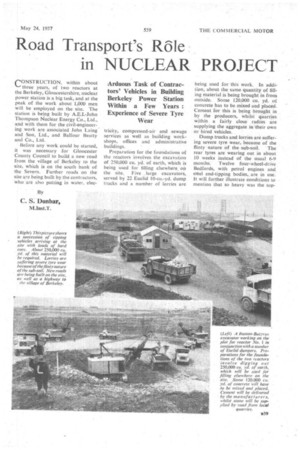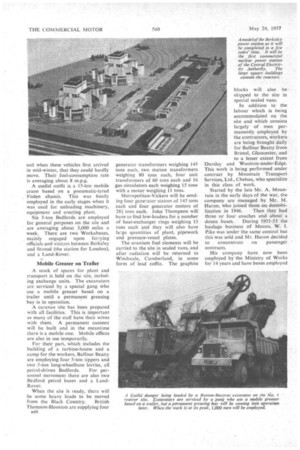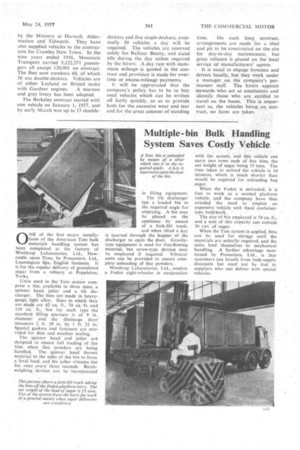Road Transport's Role in NUCLEAR PROJECT
Page 77

Page 78

Page 79

If you've noticed an error in this article please click here to report it so we can fix it.
Arduous Task of Contractors' Vehicles in Building Berkeley Power Station Within a Few Years : Experience of Severe Tyre Wear
By C. S. Dunbar, M.Inst.T.
CONSTRUCTION, within about three years, of two reactors at the Berkeley, Gloucestershire, nuclear power station is a big task, and at the peak of the work about 1,000 men will be employed on the site. The station is being built by A.E.I.-John Thompson Nuclear Energy Co., Ltd., and with them for the civil-engineering work are associated John Laing and Son, Ltd., and Balfour Beatty and Co., Ltd.
Before any work could be started, it was necessary for Gloucester County Council to build a new road from the village of Berkeley to the Site, which is on the south bank of the Severn. Further roads on the site are being built by the contractors, who are also putting in water, eke tricity, compressed-air and sewage services as well as building workshops, offices and administrative buildings.
Preparation for the foundations of the reactors involves the excavation of 250,000 cu. yd. of earth, which. is being used for tilling elsewhere_ on
the site._ Five . large excavators, served by 22 Euclid 10-cu.-yd. dump trucks and a number of lorries are being used for this work. In addition, about the same quantity of filling material is being brought in from outside. Some 120,000 cu. yd. of concrete has to be mixed and placed. Cement for this is being brought in by the producers, whilst quarries within a fairly close radius are supplying the aggregate in their own or hired vehicles.
Dump trucks and lorries are suffering severe tyre wear, because of the
flinty nature of the sub-soil. The rear tyres are wearing out in about 10 weeks instead of the usual 679 months. Twelve four-wheel-drive Bedfords, with petrol engines and steel end-tipping bodies, are in use. It will further illustrate conditions to mention that so heavy was the top
soil when these vehicles first arrived in mid-winter, that they could hardly move. Their fuel-consumption rate is averaging about 8 m.p.g.
A useful outfit is a 15-ton mobile crane based on a pneumatic-tyred Foden chassis. This was busily employed in the early stages when it was used for unloading machinery, equipment and erecting plant.
Six 5-ton Bedfords are employed for general purposes on the site and are averaging about 3,000 miles a week. There are two Workabuses, mainly engaged upon ferrying officials and visitors between Berkeley and Stroud (the station for London), and a Land-Rover.
Mobile Greaser on Trailer A stock of spares for plant and transport is held on the site, including exchange units. The excavators are serviced by a special gang who use a mobile greaser based on a trailer until a permanent greasing bay is in operation.
A caravan site has been prepared with all facilities. This is important as many of the stall have their wives with them. A permanent canteen will be built and in the meantime there is a mobile one. Mobile offices are also in use temporarily.
For their part, which includes the building of a turbine-house and a camp for the workers, Balfour Beatty are employing four 5-ton tippers and two 5-ton long-wheelbase lorries, all
petrol-driven Bedfords. For personnel movement there are also two Bedford petrol buses and a LandRover.
When the site is ready, there will be some heavy loads to be moved from the Black Country. British Thomson-Houston arc supplying four E40 generator transformers weighing 145 tons each, two station transformers weighing 80 tons each, four unit transformers of 60 tons each and 16 gas circulators each weighing 15 tons with a motor weighing 11 tons.
Metropolitan-Vickers will be sending four generator stators of 145 tons each and four generator motors of 281 tons each. John Thompson will have to find low-loaders for a number of heat-exchanger rings weighing 15 tons each and they will also have large quantities of plant, pipework and pressure-vessel plates.
The uranium fuel elements will be carried to the site in sealed vans, and after radiation will be returned to Windscale, Cumberland, in some form of lead coffin. The graphite blocks will also be shipped to the site in special sealed vans.
In addition to the labour which is being accommodated on the site and which consists largely of men permanently employed by the contractors, workers are being brought daily for Balfour Beatty from Bristol, Gloucester, and to a lesser extent from Dursley and Wootton-under-Edge. This work is being performed under contract by Mountain Transport Services, Ltd., Chelsea, who specialize in this class of work.
Started by the late Mr. A. Mountain in the early days of the war, the company are managed by Mr. M. Haron, who joined them on demobi
lization in 1946. Then they had three or four coaches and about a
dozen buses. During 1951-53 the haulage business of Messrs. W. J. Pike was under the same control but this was sold and Mr. Haron decided to concentrate on passengir contracts.
His company have now been employed by the Ministry of Works for 14 years and have buses employed by the Ministry at Harwell, Aldermaston and Tidworth. They have also supplied vehicles to the contractors for Crawley New Town. In the nine years ended 1956, Mountain Transport carried 5,122,271 passengers all except 120,901 on -contract. The fleet now numbers 60, of which 36 are double-deckers. Vehicles are of either Leyland or Bristol make with Gardner engines. A maroon and grey livery has been adopted.
The Berkeley contract started with one vehicle on January 1,, 1957, andby early March was up to 15 double
deckers and five single-deckers; evenMany 30 vehicles a day will be required. The vehicles are reserved solely for Balfour Beatty, and stand idle during the day unless required by the hirers. A day rate with maximum mileage is quoted in the contract and provision is made for overtime or excess-mileage payments.
It will be appreciated that the company's policy has to be to buy used vehicles which can be written off fairly quickly, so as to provide both for the excessive wear and tear and for the great amount of standing time. On each long contract, arrangements are made for a shed and pit to be constructed on the site for day-to-day maintenance, but great reliance is placed on the local service of manufacturers' agents.
It is usual to etigage foremen and drivers locally, but they work under a manager on the company's permanent staff. The hirers appoint stewards who act as conductors and identify those who are entitled to travel on the buses. This is important as, the vehicles being on contract, no fares are taken.








































































































































